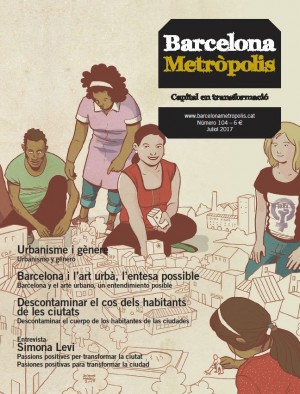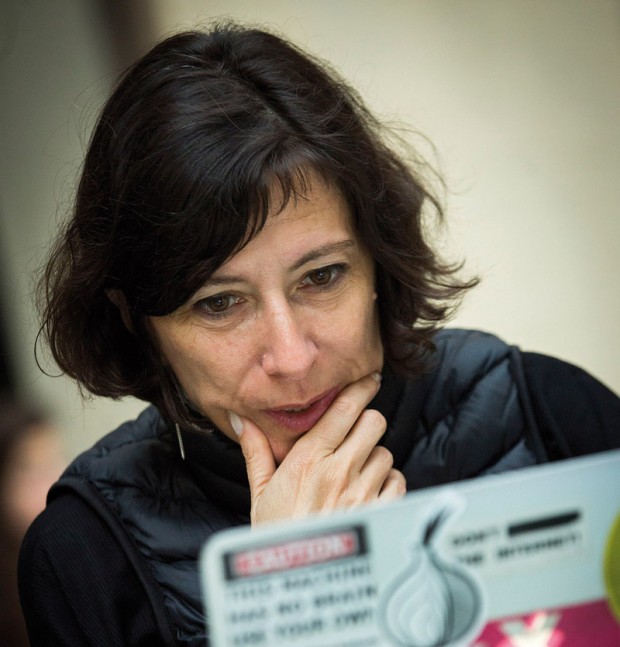Digital technology has changed society, but there is still a long way to go. As part of the Xnet action group, Simona Levi works to improve democracy in the digital age and to make values such as transparency and participation a reality, not just empty words.
We’re chatting outdoors at a café in Ciutat Vella. While we talk, the mild late afternoon sun goes down and the other tables fill with people. A young man is working on his laptop and many of the customers have their mobiles on the table. We have been immersed for some time now in the digital age, technology is part and parcel of our lives, but in some spheres it has not brought any real change of system.
Simona Levi (born in Turin, Italy in 1966), playwright and activist, works to bring about two revolutions in the new digital world: a citizen-led democracy and the liberalisation of culture. With these two goals, this Italian-born woman – who settled in Barcelona in 1990 – is the driving force behind three groups: Xnet, Grup Ciutadà contra la Corrupció, and 15MpaRato, the group that took Bankia to court and that uncovered the ‘black cards’ scandal – a tax evasion ploy involving Bankia executives. Levi’s latest book, Votar y cobrar. La impunidad como forma de gobierno (Voting and getting paid. Impunity as a form of government) (published by Capitán Swing), was co-written with Sergio Salgado and tells the story of how this scandal developed. It also includes the text of the play Hazte banquero (Become a Banker), a piece of theatre which opened to great acclaim at Barcelona’s Grec Festival in 2016. Although by rights she is a theatre director, her works have always had a strong element of protest and revolved around themes such as speculation, the limitations of representative democracy and the concept of ownership. But she has recently embarked on a new adventure as Director of the Master’s Programme in Civil Rights, Technopolitics and Digital Culture, set up by the Pompeu Fabra University (UPF) and the first of its kind in Spain.
On February 23rd the ruling on the ‘black cards’ case was made public. The sentences passed on all the accused, including former Minister for the Economy and ex-President of the International Monetary Fund, Rodrigo Rato, total one hundred and twenty years in prison. After six years of protest through the 15MpaRato movement, what’s your assessment?
The sentence is great; it would have been scandalous if there hadn’t been a conviction. Regardless of the doubts many people have, we’re sure about what we’re doing and we know the story will end well.
The story goes on: the accused have appealed the sentence and there is yet to be a ruling on the preferred shares fraud and Bankia’s flotation on the stock market. Is this victory a success for civil society?
Undoubtedly. We’re just catalysts: as activists, our job is to set up the structures that drive the collective work. 15MpaRato is a clear example of my political theory, based on technopolitics, and of my approach to strategy design, focusing on catalysing the collective effort. When the 15MpaRato movement started, we had nothing, just a single thought in our heads: to reveal who was responsible for what was happening with Bankia. So without the 144 people who presented their cases to us so that we could stand as the private prosecution; without the people who gave us evidence and leaked the emails of Miguel Blesa, former Chairman of the Board of Caja Madrid; and without the members of the public who donated money through crowdfunding, we wouldn’t have been able to do anything.
Bearing in mind the severity of the financial crisis, has the public fought back enough?
Bearing in mind the situation – one in four people unemployed –, I think that Spain’s collective intelligence has been exemplary, and in Catalonia even more so. Generally speaking, we have a very active civil society. We’ve had a financial crisis worse than that of Greece, but we haven’t set anything on fire here. We’ve just done politics, in the broadest sense of the word. In my view, the revolution of this century was started by the Indignados on 15 May 2011; a movement comparable to the French Revolution. Both of these processes arose from the birth of a technology. As a consequence of the invention of the printing press in Germany and the resulting dissemination of information, the Enlightenment came about and the French Revolution took place. And now, the same thing has happened with the Internet. Both the 15M movement and the other mass protests of 2011 went hand in hand with the hacktivist philosophy and were ‘digital native’ revolutions. That doesn’t mean that the protagonists were digital natives, but for the first time these revolutions were born from the Internet, from Facebook, Twitter, and so on. And that has to be seen as a really big step in the new forms of democracy.
When political parties are born out of these revolutions, as is the case with 15M, do they lose their values?
It depends. In 2013 we set up the Partit X, which aims to set an example of what parties that shouldn’t be parties, should be. My approach is very futuristic in that sense.
So I see. And what should a “party that isn’t a party” be like?
Just like other technologies have done throughout history, the Internet brings disintermediation. In other words, it changes the role of mediators. We’ve already seen this in the mass media, in the dissemination of culture, in the economy… And now it must also have consequences in governance and the organisation of parties. Before, parties were vital for finding out what was going on in Parliament, but today even normal citizens have access to the chambers. So while the parties have lost some of their functions, maybe they don’t need to disappear altogether; but they do need to reshape. That’s why Partit X proposes the creation of non-intermediary political groups that don’t steal the narrative from civil society, but instead catalyse its efforts. We also believe that legislation belongs to the past, condensing and solidifying the efforts of civil society. The ratification of a law should be the end of a process – not the beginning. For example, the suffragettes’ struggle ended when women won the right to vote. In other words, the parties have to help civil society to create governance, because democracy is not produced by parties or governments; it’s produced by the people. Neither do I believe in an assembly-style system because today, the Internet offers new forms of participation and ways to control the authorities.
Can the traditional parties adapt to the changes brought by this democratic revolution in the digital age or do you think that change can only come from new groupings?
The Podemos brand is a political scam; it’s nothing different to Izquierda Unida. In this case, we can’t talk about new politics. Barcelona en Comú, on the other hand, is bringing new politics because it’s reformulating certain things: for example, it recognises civil society in its otherness. While Podemos is trying to represent and neutralise civil society, Barcelona en Comú recognises the combined efforts of various groups: PAH, Xnet, 15MpaRato, etc. Candidatura d’Unitat Popular (CUP) also has interesting aspects and other groups are also being formed. But the only ones who have really set out to redesign the political party system is Partit X. For example, we were an anonymous party for the ten months running up to the elections, precisely so we could distance ourselves from fanaticism. It shouldn’t be about liking a politician, but about liking actions, results and solutions. And finally, we mustn’t forget that nowadays political parties are large client-based structures – their candidate lists always depend on a leader, even if that leader has been elected in primaries – so they are easily corruptible. In this context, I defend small parties and new forms of relationship; but that doesn’t mean that, as things stand, I am not working smoothly with all the current political parties.
Corruption and fraud, after unemployment, are the second biggest concern for Spaniards, according to the CIS (Sociological Research Centre), but when there are elections, we don’t seem to be punishing the governing parties enough. Do we have the politics that we deserve?
That’s because there are no other options and because we tend to mythicize elections. Elections are not democracy; they are just a small but important moment in it. Democracy should be a normal, everyday task, not a painful one. We cannot evaluate change simply through electoral change.
There are two words currently in vogue in politics: transparency and participation. What is your opinion of the work being done in Barcelona in these two areas?
It’s a really interesting experiment. Ada Colau is extremely intelligent, politically speaking; she’s a woman who can handle subtleties and is pragmatic. And, for me, that is the politics of the future. Up until now, politics was driven by ideology, and ideology-based solutions were implemented even if they were not efficient. But the new politics tries to solve problems based on personal experiences. Barcelona en Comú is an organisation with some good things and some not so good things, but it is an interesting space and I believe in Ada Colau.
When it comes to transparency, some good work is being done by the Catalan Government and by Barcelona City Council. The Law on Transparency that was passed by the Catalan Parliament is nothing at all like the Spanish law. In this sense, the Generalitat is taking specific actions, without being dogmatic, and is doing the right thing. Indeed, if we bear in mind that transparency has become part of the dogma of all the political parties, it’s a pleasant surprise to find an institution that is actually serious about implementing it. And Barcelona City Council has also been a pioneer in this area. We took part in setting up the good governance suggestion box, the first such channel run by a government institution anywhere in the world, which allows civil servants and the general public to report corrupt practices. The role of the Director of the Office for Transparency, Joan Llinares, is to draw attention to cases of corruption; it’s a very important position and he’s doing ground-breaking work. We have offered our help because we feel that this ethics and good governance box will be well used and well protected. The fact is that there is a lot of manipulation around the concept of anonymity: some whistle-blowers who use the service think that they are doing so anonymously, but they are actually being registered. That’s why we at Xnet started the “Torna l’Stasi” (“The Stasi is Back”) campaign to protest against the authorities that promise anonymity and then don’t deliver.
I get the impression that we’ve overused the term “transparency” before we’ve even made it happen.
Yes, there have been many mistakes made when it comes to transparency; that’s why I prefer to work with the concept of asymmetry. The transparency that we must demand from an institution is very different to the transparency we must demand from people. In other words, crystal-clear institutions, but privacy for people. And yet, today we are seeing a fanatical idea of transparency: more often applied to the little, defenceless people than to institutions. More transparency is demanded of an association than of a member of parliament. The concept of transparency has been radicalised and that’s why we are having some very fruitful discussions with the Catalan Government and with Barcelona City Council and some pretty fruitless discussions with the Spanish Government.
So, in your view, what is the recipe for good governance?
Transparency of institutions, protection of people’s privacy, E-rulemaking or the legislative power of the people, the right to a real and not a representational vote, and referenda. Basically, to create effective and real channels through which the general public can keep watch over the institutions.
In March the Pompeu Fabra University (UPF) announced that you would be heading its Master’s Programme in Civil Rights, Technopolitics and Digital Culture, which is a pioneering course.
We have to remember that the Internet brings us technology, but above all, a shift in our mindset. The printing press didn’t mean that everyone had a printer at home, but it did mean that information was circulated in a different way. Similarly, today the Internet also allows us to debate dogmas more easily. This mental shift is happening now and it will have repercussions in politics, in economics, in human rights, and so on. But we also need to understand it if we are to change civil rights; we need to know how to use the tools and create new laws and opportunities within this context.
We’ve talked about technopolitics, but not about digital culture. You’ve expressed your support for piracy. Why?
I work on the premise that culture has to be circulated and shared. But careful, we need to share concepts and the profits. Historically, piracy existed because Spain and Portugal had the monopoly over trade with America. When the monopoly disappeared, so did the pirates. We’re in the same situation today. We need to let information and culture circulate because we are their audience, but the money that is generated by this distribution must also be shared. In fact, just before the publication of my latest book, Votar o cobrar, I decided to change my publisher because the first one was offering me the standard publishing contract, a document that doesn’t share anything, that just seeks to subjugate the author and strip away her rights. The publishing house told us that in forty years, we were the first people to turn down the contract, which means that authors are signing humiliating contracts. For example, nothing is paid for the manuscripts, but they are the basis of the books. To conclude: the pirates are not the members of the public that enjoy the arts and entertainment and circulate them; it’s the people who accuse them of being pirates. What is really detrimental to an author is not piracy: it’s not having his or her work acknowledged. Put another way, piracy doesn’t exist. What exists are the monopolies that don’t want to share culture.
That also requires a change of mindset from authors, who are often overprotective of their work…
Authors have believed that they owned the copyright when in fact they don’t. The publisher sells the product to the market and then gives the author a part of the profit, around 10% or less. That’s not a matter of rights! It’s a perversion of the term. Again: all this only goes to show that the real pirates are someone else, not the people who share culture and, generally speaking, we need more redistributive contracts.
You and Sergio Salgado in your book Votar y cobrar publish the full text of the play Hazte banquero, based on the emails of Miguel Blesa. In Simona Levi’s view, must the concepts of theatre and protest always go hand in hand?
My trade is making theatre and that’s the tool I use. At Xnet and 15MpaRato we’ve always thought that narrative is key when it comes to changing things. And theatre is a very important vehicle. With only ten or fifteen performances of Hazte banquero we’ve achieved half the impact we’ve made through seven years of work and protest.
There are also plans to make it into a film, right?
We’re working with Minoria Absoluta. We’ve already signed the contract for the rights. It will probably be an Anglo-Catalan production because Spanish producers feel that we are too quarrelsome with the parties. We could have worked with Spanish producers that support Podemos, because there are a few, and this party is not involved in the case, but we will never form part of Pablo Iglesias’s group.
Should all protests be made with a sense of humour?
Yes. Gloomy passions don’t help to change things, they only serve to weaken us and to make us self-destruct. Simply pointing out that politicians don’t respect us, steal what is rightfully ours and that we’re surrounded by corruption doesn’t help us to build anything. But positive passion is the tool for change. I work with just humour and with information.





